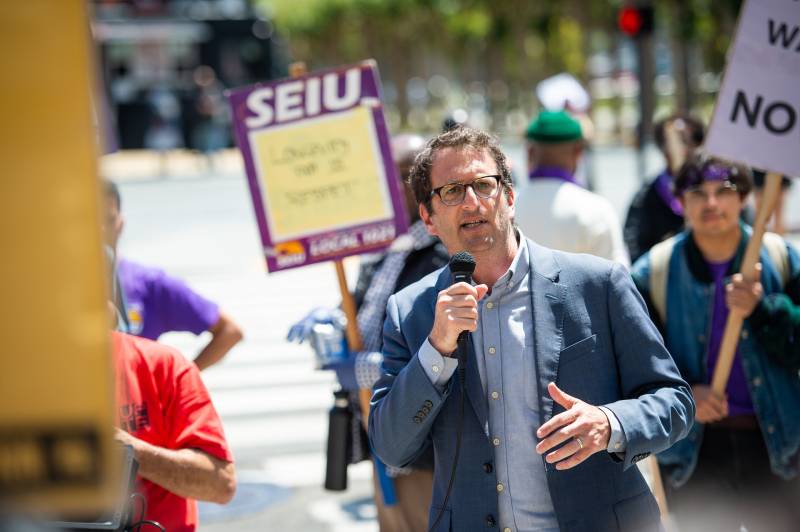In December 2023, volunteers supporting Preston released their own report, slighting the “graveyard” and critiques of his housing record as “disinformation.” According to their site, “Dean’s Housing Record,” Preston voted to approve over 29,800 housing units through 2023, 86% of which were affordable.
A few of the projects it includes are among those Smith’s lawsuit said were false and misleading, such as the temporary transition of hotel rooms to low-income housing during the COVID-19 pandemic and 10,000 units of municipal housing approved through Proposition K, a ballot measure passed by voters in 2020.
“If I had voted against [authorizing] Proposition K, my critics would say I was opposing 10,000 units,” Preston said, arguing against Smith’s claim that voters, not board members, approved these units.
“Somehow, when I’m the author of that ballot measure [and] I voted for that ballot measure at the [Board of Supervisors] to put it on the ballot, somehow it’s incorrect for someone to characterize that as a vote for 10,000 units of housing,” he said.
Smith said he believes Preston is opposed to building market-rate housing, which he calls a hindrance to increasing development.
“Some people think, ‘The only thing we need to be building is affordable housing,’ and I think that’s actually a mask for those who actually want to oppose housing but are scared to do so politically,” Smith said.
Smith’s Housing Action Coalition and other pro-development groups like SF YIMBY argue that building more housing at every level will bring all housing costs down, often going toe to toe with Preston and other progressive city leaders like Supervisor Aaron Peskin, who is running for mayor. Preston and Mayor London Breed have commonly sparred over the number of affordable units in housing projects.
One of Preston’s two challengers in his reelection campaign, the SF YIMBY-endorsed Bilal Mahmood, has also parrotted the claim that Preston is a NIMBY.
“He has blocked thousands of units of housing, not just affordable housing but middle-income housing,” Mahmood told KQED in March. “We need to be building housing at all levels, and Dean has been standing in the way of that progress.”
In pushing back against this week’s lawsuit, Preston called the Housing Action Coalition, which describes itself as a nonprofit advocating for more homes at all levels, a “landlord lobbyist group” and said its leaders have sued to try to halt multiple of his office’s affordable housing efforts.
“I can only describe it as a publicity stunt and probably designed to drain our campaign of time and resources defending ourselves,” Preston said, adding that his voting record is public and saying that he favors affordable housing.
Preston also pointed to a recent report from the city’s Housing Stability Fund Oversight Board that examined affordable housing funds his 2020 ballot measure, Proposition I, which doubles the transfer tax on properties sold for over $10 million, has generated.
Proposition I revenue, which flows into the general fund but is intended for use on rent relief and affordable housing, according to Preston, has reached $324 million since 2021. Of it, $203 million has advanced affordable housing initiatives and provided emergency rent relief, including by acquiring five sites for affordable housing projects totaling 550 units and a sixth to build 66 units of educator housing.
The efforts to further affordable housing have been an uphill battle, Preston said, blaming Breed for not earmarking any general fund money for affordable housing projects in her annual budget since Proposition I passed.
“I don’t want to sugarcoat, at the end of the day, we need massive federal and state investment to really scale up affordable housing in San Francisco, but through Prop. I, we really showed that people are willing to levy this kind of tax in order to push to fund these kind of alternate strategies for affordable housing locally,” he said.

